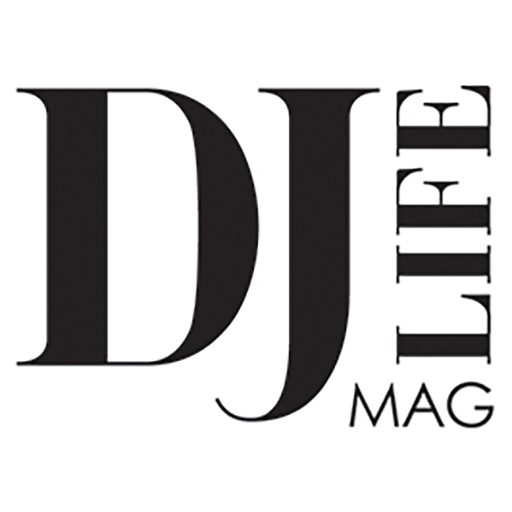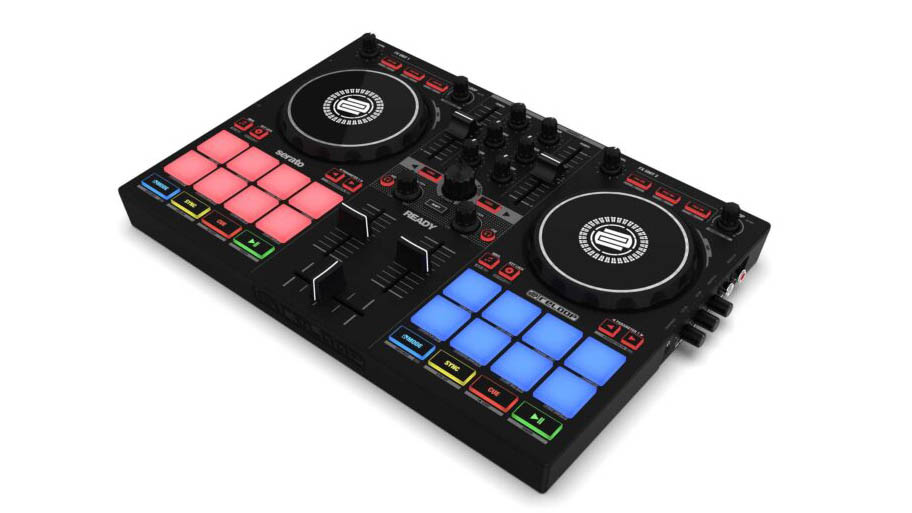The Ready from Germany’s Reloop is a portable controller for Serato DJ, Algoriddim DJay, and Virtual DJ software that fits an important niche among controllers on the market, and gets the job done – mostly.
Distributed Stateside by American Music & Sound in Bloomfield, Conn., the Ready has two platters, a full eight performance pads per deck with eight pad modes, FX controls, hi-pass/lo-pass filter knobs, two-band EQ, gain knobs, a reliable crossfader, and long-throw tempo faders.
To my ears, it has the best sound quality of any controller I’ve heard that could fit in a backpack. It’s built to match the size of a 13-inch laptop, and easily fits into my Jetpack backpack that I use as a personal item on airplanes.
Overall, the controller works great and feels solid, especially for its size. It outputs audio via a single pair of RCAs, and has an 1/8-inch jack for headphones. It connects to laptops via USB-B, and connects to phones and tablets for Algoriddim DJay via a USB-A port. It has no audio inputs.
The Reloop Ready ships with Serato DJ Intro included, and the option for a paid upgrade to Serato DJ Pro. It is natively compatible with Virtual DJ, as well as Algoriddim DJay for an even more portable setup.
The weeks I had the test unit happened to be a particularly busy stretch of gigs for me, with a variety of situations. My first time bringing it out was for a silent disco, where the lack of microphone input seriously hampered me, and I had to switch out controllers partway through. Most often I’m plugging my controllers into a DJ mixer or mixing board, where you can still use a mic and this isn’t an issue. Still, at my very first gig, I already ran into the Reloop Ready’s limitations.
The condensed layout works for my larger hands, though at first, I frequently bumped the volume faders down while using the filter knobs. The platters work unexpectedly well with a light touch, yet I found they would stick if I applied excess pressure downward. On turntables and CDJs, I frequently beatmatch via the tempo faders, and working that way on the Reloop Ready felt easy and fluid.
As an open-format DJ, I rely on mid-band EQ frequently to blend songs from different eras and production styles, or to cut overlapping vocals. While testing the unit, I must admit I shied away from playing tracks that I knew could benefit from using the mid-band EQ, and I ran into transitions where I wished I could filter the vocals. If there were alternatives on the market with a similar size and full 3-band EQ plus gain, I wouldn’t be so critical about mid-band EQ being missing on this controller. However, I must note that the Reloop Ready is the closest thing we have to a professional, portable Serato controller still on the market.
Some controllers in the past have succeeded in being compact, while retaining the full traditional mixer panel and a microphone input. The Novation Twitch had a similar form factor with 3-band EQ, gain, and a mic input, though it traded platters for touch strips. The Korg KAOSS DJ, recently discontinued for Serato yet still working for Virtual DJ and Traktor, managed to have 3-band EQ, gain, and a microphone input in an even smaller package than the Reloop Ready. In the early days of Serato controllers, the portable Vestax line managed to have full 3-band EQ, gain, a microphone input, and mechanical platters.
Over time, controllers aimed at professional DJs seem to trend larger and heavier, prioritizing channels, options, screens, and bonus features like full drum sequencers. This must appeal to a large segment of DJs, presumably those who focus on mobile gigs, play open-format sets, own cars, and rarely fly for gigs. In contrast, DJs who work as touring artists, or those who play specific genres, seem to have, in large part, made the switch to USB sticks via rekordbox long ago, avoiding the need for laptops and controllers altogether.
I myself straddle these worlds. I need a professional controller with the full conventional knob and fader layout, that fits under an airplane seat and can keep up with my lifestyle without breaking my back.
I’m a longtime professional DJ in New York City who doesn’t own a car, frequently flies for gigs, and uses a laptop. I often play in circumstances where I can’t confirm the equipment ahead of time. I do mobile gigs and tour as an artist, as well. I play house-music events in Chicago, roller-skating events in NYC, and classic hip-hop at block parties. I play bass-music stages at West Coast festivals. I play drum-n-bass events all over the world. I play weddings, corporate events, and open-format bars and clubs. I play venues where they ask for a rider, have a full set-up of club-standard Pioneer gear, and cater to my every tech need. I play on boats and in forests and in deserts where I’ll be lucky to have a mixing board, and may even be asked to plug directly into speakers. I play in roaming party buses where I’m crammed into a corner and have to hold my controller in my lap.
In clubs and on festival stages that have equipment budgets, I often have the luxury of using my preferred setup: a Pioneer DJM-900NSX2 as my audio interface for Serato DJ Pro, along with CDJs. Yet I always need to be ready for less-than-ideal circumstances, as my career colors outside the lines of conventional venues.
USB sticks can’t handle the variety of events that I do, at least not with any efficiency, and they don’t help at all when an event has non-standard equipment. On the other hand, I struggle to carry most large full-featured controllers, and I’m not a small person. It’s one more thing to pay attention to, plus walking around New York or London late at night obviously carrying musical equipment can make me a target for theft. Furthermore, when I fly to gigs, I don’t trust my gear under the plane, and I often need as much space in my carry-on as I can get. Few full-featured controllers even fit in a carry-on, and when they do, they take up the same space as a week’s worth of touring outfits. So, that leaves me with few choices in today’s market.
If I stick with Serato and use a controller than fits in a backpack, the only other options still available for retail purchase would be Numark Party Mix II/Live, the Numark DJ2GO2 Touch, and the Hercules DJControl Starlight. However, for professional use, none of those controllers hold a candle to the Reloop Ready, in my view.
I’ve used Serato since the black and white Rane boxes, essentially since Serato Scratch Live launched, and I love the workflow. I desperately don’t want to switch. If I were to switch to Virtual DJ or Traktor, the options open up a bit: the Reloop Beatpad 2 should barely fit under an airplane seat and has all the features a professional DJ needs. Alternately, you could go smaller with a Traktor Kontrol Z1 or a Reloop Mixtour, both of which have 3-band EQ and gain. If Serato still sold a controller of that size and style, like the discontinued AKAI AMX, I’d be content, as I’m very comfortable mixing with Serato’s internal mode hotkeys, when necessary.
Speaking of rekordbox DJ via laptop, the situation is just as grim. The only controllers not discontinued are too large for my travel standards. Though discontinued, the Pioneer DJM-200 is still available for sale, but it again comes frustratingly close to good enough, as it leaves out gain knobs. Both the Reloop Ready and Pioneer DJM-200 could easily be marginally bigger and include the full traditional mixer panel. If manufacturers are reading this, I beg you, please make a professional-grade controller that fits these parameters. I’m certain I’m not the only one with these needs.
If you’re a professional DJ and Serato user looking for a backup controller for critical gigs, or for an easy travel controller just in case a gig pops up, the Reloop Ready is the best choice available. If you’re a professional touring Serato DJ and still use a laptop like I do, and you need to be ready for absolutely any tech situation, then the Reloop Ready is literally your only practical option. If you use Virtual DJ or Traktor and prioritize portability, the Reloop Ready will serve you well. If you prefer an iPad/iPhone style setup, the Reloop Ready with Algoriddim DJay seems like a fantastic choice.
If the Reloop Ready fails to meet manufacturers’ expectations, controller companies might assume the consumer doesn’t prefer professional-grade, truly portable controllers. Ironically, one more knob could make all the difference in its success and in the success of the portable controller market. I know I would buy one – or several – if they made it.
Still, for its size, build, sound quality and support for most DJ software on the market, Reloop Ready – which can be purchased for about $379 – might still very well suit your particular needs.
To check out more gear reviews, click here.


